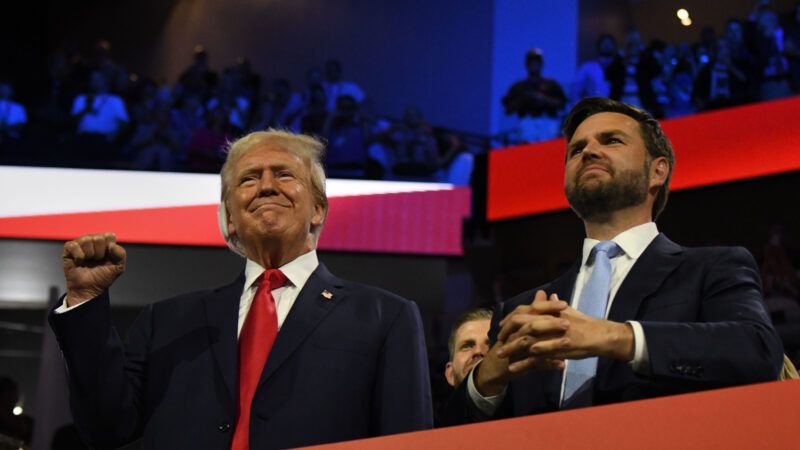Trump and Vance's Foreign Policy Is More War Disguised As Anti-War
Despite flirting with “America First” realism and restraint, the Republican ticket is all-in on the forever wars.

From the headlines, you would think that Republican presidential candidate Donald Trump and his running mate J.D. Vance were committed to overthrowing the national security establishment.
"Trump Picking Vance Widens Rift With Foreign Policy Old Guard," reported Bloomberg.
"Trump's VP pick spells 'disaster' for Europe and Ukraine," fumed Politico.
For all of Trump's rhetoric about "endless wars" and Vance's attacks on "neoconservatives," however, the two politicians are all-in on some of the establishment's most destructive military adventures. And in some ways, Trump and Vance are even more hawkish than the baseline.
"A lot of people recognize that we need to do something with Iran—but not these weak little bombing runs," Vance said in a Fox News interview at the Republican National Convention on Monday. "If you're going to punch the Iranians, you punch them hard, and that's what [Trump] did when he took out [Iranian Gen. Qassem] Soleimani."
Vance praised Trump for trying to "enable the Israelis and the Sunni Arab states" to fight back against Iran. In a speech to the Quincy Institute in May, Vance tried to sell a U.S.-Israeli-Arab alliance as a way for the United States to "spend less time and less resources in the Middle East."
But that's exactly the strategy that got us here in the first place, and the proof is in the pudding. Trump's shows of force against Iran did not decisively end U.S.-Iranian conflict, nor did the Abraham Accords get Israel and the Arab states to pick up the military slack.
Instead, Trump ended up overseeing a massive U.S. military buildup in the region during his term and nearly went to war with Iran.
Vance even wants to add another counterinsurgency to America's "forever war" roster. In July 2023, he told NBC News that he would "empower the president of the United States, whether that's a Democrat or Republican, to use the power of the U.S. military to go after these drug cartels" in Latin America.
Washington is already heavily involved in that region's war on drugs, doling out support to Latin American militaries and border forces. Last year, several Republican candidates—including Trump himself—called for the United States to invade Mexico directly.
Trump and Vance also share the establishment view that the United States needs to get ready for a conflict with China over Taiwan. At the convention, Vance told Fox News that China is the "biggest threat" to America, and he has voiced support for building up the Taiwanese military with American weapons in the past.
To his credit, Vance has been a little more thoughtful about the risks of escalation than some other China hawks. "As a father of three young children, I really don't want to go to war with a country that makes all of our antibiotics," he said in his Quincy Institute speech. "So for the neoconservatives, maybe pump the brakes for at least 10 years."
The stance that puts Trump and Vance most at odds with the foreign policy establishment is their opposition to U.S. military aid for Ukraine. In a February speech to the Senate, Vance complained that the "experts have a new thing that American taxpayers must fund and must fund indefinitely, and it is called the conflict in Ukraine." He has also written about the munitions shortages that the war is causing, a rare moment of honesty by a politician about the limits of U.S. power.
Vance told Fox News at the convention that Trump will "go in there, negotiate with the Russians and the Ukrainians, [and] bring this thing to a rapid close." He also said that the war simply wouldn't have started if Trump were in office. Yet in practice, Trump's policies toward Russia and Ukraine were just as hawkish as those of his successor. In fact, Trump was the first U.S. president to send weapons to Ukraine—a fact that he bragged about at the time.
And tellingly, at the presidential debate in June, Trump blamed President Joe Biden's military withdrawal from Afghanistan for causing the Ukrainian conflict. "He was so bad with Afghanistan, it was such a horrible embarrassment," Trump said. "When [Russian President Vladimir] Putin saw that, he said, 'You know what? I think we're going to go in.'"
It's not really an argument against war—just a promise to be better at it than the last guy.
Many Democrats and Republicans want to have their cake and eat it too. They know that Americans are fed up with endless military conflict, but they want to make their opponents look weak. Liberal criticisms of Trump's foreign policy were just as incoherent as conservative criticisms of Biden's foreign policy.
But wanting to win harder is not a strategy. And America's problems are not simply a lack of gumption. Vance may be more willing to acknowledge the limits of U.S. power than his competition. When it comes to actually applying those insights, he falls far short.


Show Comments (165)